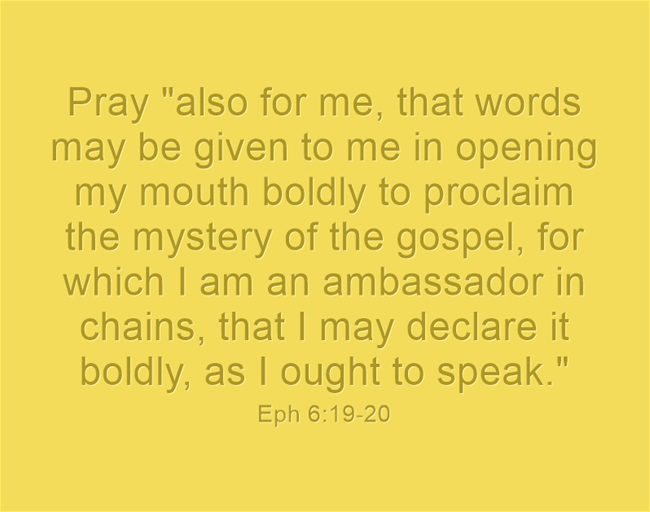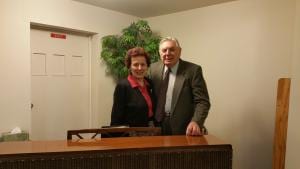Here is a Sunday school lesson or Bible study about boldness from the Bible.
Guilty Conscience?
Proverbs 28:1 “The wicked flee when no one pursues, but the righteous are bold as a lion.”
When someone is startled by something another person might ask, “Guilty conscience?” meaning that they must have had some reason to scared so easily. That’s the idea of this verse. The greatest fear that unbelievers may not even confess is that God is real and God will judge them for their sin, but most of all, for their rejection of Jesus Christ. Some even disparage His holy name, use it as blasphemous words or curse words and their profanity laced language uses the name of God or Jesus in about every word. They may not say they don’t fear God but at the “the sign of the Son of Man…all the tribes of the earth will mourn, and they will see the Son of Man coming on the clouds of heaven with power and great glory” (Matt 24:30). The Apostle John puts it well in writing “Behold, he is coming with the clouds, and every eye will see him, even those who pierced him, and all tribes of the earth will wail on account of him” (Rev 1:7). They mourn and wail because they realize that they’ve lived a life of sin and customarily persecuted Christians, and now they see the Holy, Just Judge of the Universe and know what’s coming next (Rev 20:12-15)!
Have you ever had a guilty conscience over something you did?
Why are the righteous “bold as a lion?”
Why is it critical we tell people they must repent and trust in Christ (Rev 21:8)?
The Disciples Boldness
Acts 4:12 “Now when they saw the boldness of Peter and John, and perceived that they were uneducated, common men, they were astonished. And they recognized that they had been with Jesus.”
All throughout the Book of Acts, you read about the disciple’s courageousness and boldness in proclaiming the gospel, despite the beatings, the imprisonments, and threats of death. At one time in particular, the church’s prayer was “Lord, look upon their threats and grant to your servants to continue to speak your word with all boldness” (Acts 24:29). Their prayer wasn’t, “Oh God, stop the persecution and just let us have some peace.” No, they wanted to be bold in their sharing the gospel and not be inhibited by any persecution or threats. Soon after they prayed for God’s servants to “speak your word with all boldness,” “the place in which they were gathered together was shaken, and they were all filled with the Holy Spirit and continued to speak the word of God with boldness” (Acts 4:31). God answered their prayer at the very moment it was asked. This explains why Paul could write, “Since we have such a hope, we are very bold” (2nd Cor 3:12) but Paul still requested the church pray, “also for me, that words may be given to me in opening my mouth boldly to proclaim the mystery of the gospel for which I am an ambassador in chains, that I may declare it boldly, as I ought to speak” (Eph 6:19-20).
How did they perceive the disciples were uneducated men?
How were they able to recognize “that they had been with Jesus?”
Do you ever pray for the persecution to stop or do you pray to be bolder for Christ?
Would you ever ask someone to pray for you about having boldness?
The Apostle Paul’s Boldness
Ephesians 6:19-20 Pray “also for me, that words may be given to me in opening my mouth boldly to proclaim the mystery of the gospel, for which I am an ambassador in chains, that I may declare it boldly, as I ought to speak.”
Paul had just been requesting prayers be made for all the saints at all times (Eph 6:18) but also for Him and prayed above all that he might “boldly proclaim the mystery of the gospel” and in Acts 19:8 it shows that “he entered the synagogue and for three months spoke boldly, reasoning and persuading them about the kingdom of God.” That’s very bold! Taking the gospel into the Jewish synagogue!? No wonder they beat him, stoned him, and imprisoned him, even once thought him to be dead (Acts 14:19). Even near the end of the Book of Acts, we still see Paul “proclaiming the kingdom of God and teaching about the Lord Jesus Christ with all boldness and without hindrance” (Acts 28:31) but it’s important to note that Paul also prayed that the right “words may be given to” him when the opportunity came, so that he might accurately “proclaim the mystery of the gospel.” He considered himself to be an ambassador, even in chains.
Would you consider yourself an ambassador for Christ (2nd Cor 5:20)?
Why does Paul often call it “the mystery of the gospel?”
Have you prayed that God would put the right words in your mouth when given the opportunity to share the mystery of the gospel of Christ?
Would you ask someone to pray for that you would have the right words to say?
Our Boldness
Ephesians 3:11-12 “This was according to the eternal purpose that he has realized in Christ Jesus our Lord, in whom we have boldness and access with confidence through our faith in him.”
Paul wrote as if he had complete confidence to Timothy, saying “I am not ashamed of it, for I know the one in whom I trust, and I am sure that he is able to guard what I have entrusted to him until the day of his return” (2nd Tim 1:12) just as the author of Hebrews could confidently say, “Let us then with confidence draw near to the throne of grace, that we may receive mercy and find grace to help in time of need” (Heb 4:16). To be sure, we are not the source of our own boldness. Our boldness is “through our faith in Him” because “Christ is faithful over God’s house as a son. And we are his house if indeed we hold fast our confidence and our boasting in our hope” (Heb 3:6).
Do you have the confidence to come to God in prayer?
Where or Who does your confidence come from?
Is boldness the same as confidence?
Conclusion
I urge you in your study to look at all of the Bible verses and read them aloud in the class so that you can get the most out of this lesson on boldness because in this day and age, it is getting harder and harder to find fertile ground for the Word of God to take root in and bring eternal life to those who receive it. More often, someone will plant the seed of the word, someone will come along and water it, and maybe another will fertilize it, and all of these people might have never met, but the most important point is, only God gives the increase (Acts 2:47) and “So neither he who plants nor he who waters is anything, but only God who gives the growth” (1st Cor 3:7). Knowing God grants repentance (2nd Pet 3:9) and that He alone causes the growth or spiritual birth (John 3:3-7), that should give us more confidence to boldly proclaim the mystery of the gospel of Jesus Christ. He is the Lord of the Harvest.
How many exposures to the gospel might it take before someone is saved?
How many times were you exposed to the gospel before you repented and trusted in Christ?
Do you have more confidence after this study?
What has changed in your understanding about boldness from this study?
Article by Jack Wellman
Jack Wellman is Pastor of the Mulvane Brethren Church in Mulvane Kansas. Jack is also the Senior Writer at What Christians Want To Know whose mission is to equip, encourage, and energize Christians and to address questions about the believer’s daily walk with God and the Bible. You can follow Jack on Google Plus or check out his book Teaching Children the Gospel available on Amazon.
















